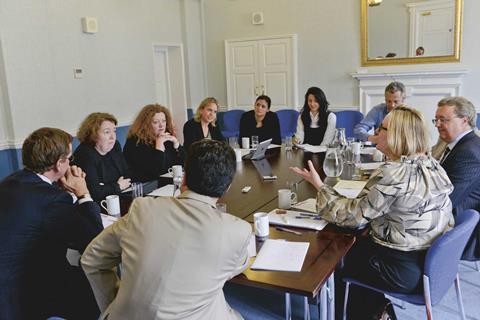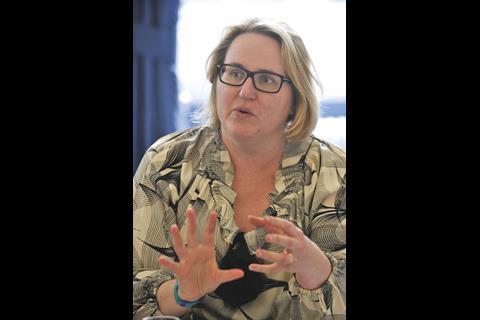The Gazette’s latest roundtable highlighted the dangers inherent in the development of a ‘two-tier’ bar
The fortunes of commercial and publicly funded barristers could hardly be more divergent at present. But it is not simply a ‘tale of two bars’. The bar’s monied and impecunious sections are co-dependent, according to those present at the Gazette’s roundtable discussion on the future of the bar.
That division in fortunes is not new. But it has increased, and if further legal aid cuts follow, will become even more dramatic. As the discussion starts, it is noted that of 1,700 students emerging from bar school each year, perhaps fewer than 400 will secure pupillages – a modern low.
As 2 Bedford Row’s Maura McGowan, chairman of the bar, puts it: ‘Overall, the bar is doing quite well and we think the average income, if you include all the commercial practitioners, is certainly holding steady – if not going up. [But] what that tends to suggest is that the publicly funded side is suffering wholly disproportionately.’
That picture is confirmed by the chairman of the Criminal Bar Association, Michael Turner QC of Garden Court Chambers. Turner says fresh legal aid cuts will ‘have a huge effect’ in terms of entry to the bar and its diversity.
The bar has ‘worked pretty hard’ over the years to improve its record on diversity, he says, but: ‘Effectively, in a couple of years this profession will become exclusively the domain of the white, middle-class, self-financing advocate, which we don’t think is a very good thing for society.’
McGowan adds: ‘This will turn the clock back enormously, because all of us here could afford to start with an overdraft, as I suspect most of us did. You hoped that, in the first few years, as well as doing rubbish for very little money, you’d actually do some well-paid cases and you’d get ahead.’ Now, she says, ‘the chance of getting ahead in crime, or family, or social welfare, without family money is pretty limited’.
Debt and credit
The bar, like the solicitors’ profession, is to some extent at the mercy of government educational policy, of course. Student debts are now bigger than ever, some of those present note, at a time when bank finance for young barristers has become very restricted. ‘If you don’t have any kind of support, it’s going to be very difficult,’ reflects Hannah Kinch of 23 Essex Street Chambers, who is chairman of the Young Barristers Committee. ‘As I understand it, there’s only one bank that’s still lending for living costs for the bar year, or for the BPTC year. So it’s either going to take you longer, because you’re going to have to do more work to try and subsidise yourself and be able to fund that year; or you have to hope that you can get enough of an overdraft, enough credit cards, to be able to see you through, to then earn £12,000 doing your pupillage.’
Public law barrister Fiona Scolding from Hardwicke notes that this unhappy situation has put extra pressure on the bar’s system of bursaries, which were not always means-tested in the past. ‘Now I think pretty much all of them are means-tested,’ she says. But even with support, Scolding notes: ‘The bursary might cover you for the BPTC year, but the difficulty of coming in without a guarantee of a fairly good basic income is that you’re dealing with people who’ve got £30,000 or £40,000 worth of debt before they even begin to think about the vocational qualification. Now, that will have an impact.’

Overall, the bar is doing quite well and the average income is certainly holding steady. But what that tends to suggest is that the publicly funded side is suffering wholly disproportionately
Maura McGowan
Sets like her own, she adds, are able to guarantee pupils a decent income, but this safety net is not available to all: ‘The vast majority of my chambers do commercial work. If you’re in a publicly funded set, it is simply not financially viable to subsidise people’s careers.’
Doughty Street Chambers’ Kirsty Brimelow QC, chairwoman of the Bar human rights committee, concurs, adding: ‘There are two separate bars which have developed, and there simply isn’t the money in the publicly funded bar to support those coming through.’ The result, Scolding maintains, is that ‘the bar in reality was probably more socially mobile 30 years ago, or 40 years ago, than it is now’.
Changing roles
The group turns next to consider the future of direct access. Those with experiences of individuals’ cases are sceptical about the potential for growth in this area. Scolding explains: ‘We’re getting increasing numbers of direct access referrals. But the difficulty is managing direct access clients, because we do not have the time, nor the support network, to handle the additional level of client care which is often needed in such cases. Our experience is that you have to be very careful about the cases you agree to take. There needs to be a degree of scrutiny of them, which goes far beyond [that required] in any other kind of case.’
The challenge goes further than the skill-set, she adds. ‘It requires a very different model of the way that a set of chambers works. Much more, dare
I say it, like a model of a firm of solicitors, in terms of the level and number of support staff you need to make it work effectively.’
Cases in this category, Brimelow notes, also resemble those types of pro bono work that ‘take a huge amount of time’. Therefore, she adds, ‘direct access doesn’t work for those barristers who do pro-bono work in any event, because they do not have the time to spend with the client in the direct access work’.
The roundtable hears more positive experiences of direct access from institutional clients such as businesses and local authorities. ‘Here the bar has been doing direct access for years, and they’re good at it. They offer a fantastic and very cost-effective service compared to anybody else,’ Jomati consultants’ Tony Williams, former managing partner of Clifford Chance, notes. It is, he says, ‘a great opportunity for work’ and ‘an increasing success story for the bar’.
The growing use of arbitration in commercial disputes is another success story. Brian Lee, chair of the Institute of Barristers Clerks and a clerk at 20 Essex Street, relates that ‘at least 60% of the advocacy for members of chambers across the board is arbitration’. Despite the fact that arbitrations need not be the exclusive preserve of barristers, he is ‘always very surprised that we very rarely come across solicitors as advocates on the other side’.
Lee points out this does not just relate to arbitrations in London. Five chambers have set up in the regional arbitration hub of Singapore, he adds, tripling the number of arbitrations there in five years, while the number has remained fairly steady in London.
London’s legal sector ‘missed an opportunity’ when the Rolls Building was built, Lee believes, by failing to add a centre for arbitrations: ‘I think London will miss out in the long term, and it’s very disappointing.’
Singapore’s centre, Maxwell Chambers, was set up and well supported by the Singapore government, ‘whereas we have had this fantastic building, the Rolls Building, put up for the High Court, and no thought was given by the Ministry of Justice to set up an arbitration centre as well, where they could have sold that – made money on it’.
The Rolls Building has still been a success for the bar, McGowan points out: ‘You’ve got a vast amount of international commercial litigation being carried on there. Well over half of the cases have a foreign party or both sides are foreign litigants. The UKTI Planning for Growth Report, which came out a few months ago, shows that this is actually a remarkable success story, not just for the legal profession, but for the City.’
She adds: ‘We’re helping to show the City in a [good] light; helping them to clean up their act and be able to sell themselves overseas. Overseas litigants come here because they think our system has excellence within it, our judges cannot be bought, and people have integrity and skill. It’s not the cheapest in the world, but it is universally recognised as the best.’

At the table (clockwise from left): Tony Williams, Jomati Consultants; Maura McGowan QC, Chairman of the Bar Council; Catherine Donnelly, 6 Pump Court; Kirsty Brimelow QC, Chairman of the Bar Human Rights Committee; Hannah Kinch, Chairman of the Young Barristers Committee; Catherine Baksi, Law Society Gazette; Paul Rogerson, Law Society Gazette; Michael Turner QC, Chairman of the Criminal Bar Association; Brian Lee, Chairman of the Institute of Barristers Clerks; Fiona Scolding, Hardwicke; Eduardo Reyes, Law Society Gazette
Reputation abroad
It becomes clear that in the area of ‘reputation’ – so important to those large commercial cases – there is an interdependency between the commercial and publicly funded bar which needs to be acknowledged. As Scolding argues: ‘The vast majority of advocacy training and all the ethical training is run, in the main, by senior members of the criminal bar.’
Turner adds: ‘The commercial bar has been extraordinarily supportive to the criminal bar over these hard times, and the reason for that is that they recognise it is often the reputation of the criminal barrister abroad that brings this work in the first place. It’s a sort of “Rumpole effect”.’
Catherine Donnelly of 6 Pump Court goes so far as to question the impact of a changing bar on the standard of British judges. Judges can’t be bought, she explains, echoing McGowan. But constricting routes to the bar that have always prevented the formation of ‘financial allegiances’, she warns, risks producing judges ‘who aren’t perceived to be ethical, or clever, or independent’. She cites the example of a judge originally schooled by a profit-making corporate turned alternative business structure. How ‘independent’ will they be?
Lee hints that other jurisdictions seem more aware of the value of the bar than UK policymakers. ‘A lot of Singaporean lawyers, for example, treat being called to the bar in London as the equivalent of the final stage, or finishing school, of their legal education, and it’s very important that we continue to encourage that,’ he notes.
To defend that status in the future, Brimelow suggests, will also require the judiciary to act on justified criticism. ‘I do think that [our] judges actually need more training in terms of diversity and how to deal with international litigants,’ she says. ‘Anecdotally, one of the issues with Chinese litigants or companies coming here is that, if they feel that they’re not getting a fair hearing because of a cultural misunderstanding, they’re simply going to shift all their work to Singapore.’ This is a criticism others present have encountered in the context of arbitrations.
A case to fight
On the live news story of the moment – price-competitive tendering – the bar is as outspoken as the solicitors’ profession. ‘If [PCT] comes in, it’s a disaster,’ Turner bluntly declares. ‘There were those at the bar who thought that price-competitive tendering isn’t coming to the Crown court, so it’s not going to affect the barrister. But, of course, it’s going to affect the barrister. If you wipe out three-quarters of solicitors in this country, it’s going to affect the bar. It’s crazy to think that it won’t. The bar is going to be hit badly enough in any event by the cuts, and the effect of that is that many chambers will fold. The bar will start to work from home. The bar will disintegrate as we know it.’

If [PCT] comes in, it’s a disaster… If you wipe out three-quarters of solicitors in this country, it’s going to affect the bar
Michael Turner, Criminal Bar Association
There is evident frustration around the table that legal aid cuts, when combined with PCT and the [botched] outsourcing of core justice functions to third-party providers, remove the ability of legal sector to adjust sensibly to cuts. ‘That’s for the market to sort out,’ McGowan argues. ‘The thing I find extraordinary is that this government – this Conservative administration – is choosing to interfere in the market. It says that it wants to introduce price-competitive tendering because it will better enable the solicitors to survive the fee cuts. Well, if they’re going to cut fees for solicitors, let solicitors work out how best to survive the fee cuts.’
The lack of a holistic approach to public policy is failing to deliver value for taxpayers’ money. All are convinced that some of the mooted ‘savings’ will prove illusory. McGowan favours the establishment of a Royal Commission on criminal justice to reintroduce the concept of joined-up government. She urges ministers to say: ‘Let’s step back – look at the whole structure. Let’s look at resourcing and administering the courts; look at how much we spend on criminal legal aid and work out if it is proportionate’.
Without a change in approach, Williams notes, ‘we risk [this] just being an attritional process’.
Most in attendance also share a sense of disbelief that government policy can proceed on the basis of arguments that contain significant inaccuracies. Brimelow cites media interviews with the justice secretary where Chris Grayling was willing to ‘trot out statistics that were wholly wrong’.
Meanwhile, media interest is growing in stories that relate to waste. As parts of the justice system unravel, through poor service related to the award of the court interpreter contract, for example, or errors by other outsourcing companies, mistakes that arise from hurried cost-cutting actually cost more to rectify. There is a conviction around the table that the legal profession has fallen short in making the case that, in Donnelly’s words, the criminal bar ‘are part and parcel of the welfare state’. Judging by those attending this Gazette roundtable, many have now been galvanised to start making that case.








































No comments yet